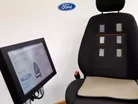Ford installs in-car heart rate monitor in its vehicles

The Ford Motor Company has announced that it is developing a car seat which will help consumers keep track of their health by monitoring their heart rate.
Ford has already recently announced an ‘allergy friendly’ range of cars which are fitted with pollen counters and it is also hoping to attach glucose monitors to its vehicles.
In this new development, the Ford team have come up with a product which monitors the electrical pulses from the driver’s heart and therefore can track certain health issues.
READ MORE FROM THE WDM CONTENT NETWORK:
To read the latest edition of Healthcare Global, click here
- Meditation helps to relieve stress and beat depression
- The Priory: A top-class research facility
- Diet and exercise tips to control weight loss
Six sensors are embedded in the back of the driver’s seat and have been designed to read the heartbeat through clothing.
It is thought the seat will be able to warn people about impending heart attacks; however, researchers have said that they are still working on a solution that works with all types of clothing materials.
During its product testing, the seat monitor has produced accurate readings for 98 percent of the time spent driving.
Ford says the system could be life saving; if the heart rate monitor detected an imminent problem with the driver’s health, it could automatically reduce the speed of the car to reduce the risk of a serious accident.
Another possible function of the monitor to send automatic updates to a doctor to help patients with existing heart problems manage their condition.
It could also even be used to provide real-time information to medical services in the event of an accident.
The managing director of Ford’s European research centre in Germany, Pim van der Jagt, said in an interview: “With the aging population and this interest in health and wellness, therecould be an interest in this type of technology.”
Ford has collaborated with German university Rheinisch-Westfälische Technische Hochschule (RWTH) Aachen University on the project.



